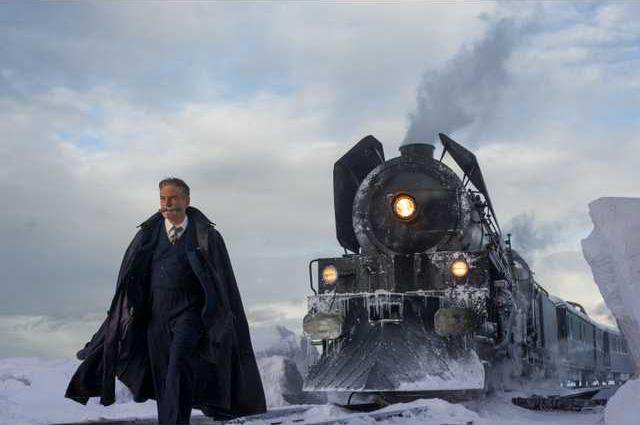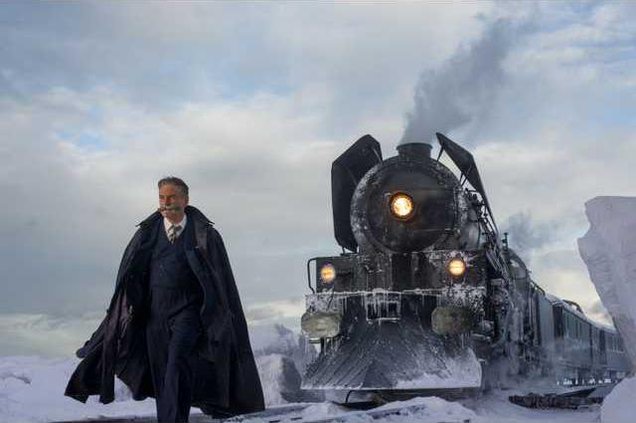MURDER ON THE ORIENT EXPRESS 2 stars Kenneth Branagh, Penelope Cruz, Johnny Depp, Judi Dench, Willem Dafoe, Leslie Odom Jr., Michelle Pfeiffer, Daisy Ridley, Josh Gad; PG-13 (violence and thematic elements); in general release
"There is right. There is wrong. There is nothing in between."
Hercule Poirot's clear-cut moral declaration sets the tone for "Murder on the Orient Express," Kenneth Branagh's adaptation of Agatha Christie's celebrated mystery novel about a murder investigation on a stranded commuter train.
Poirot, played by Branagh, is Christie's go-to protagonist, a famous Belgian investigator who echoes Sherlock Holmes' almost supernatural gift for solving crimes. By the time we meet Poirot as he stands before a crowd at Jerusalems historic Wailing Wall, about to accuse the perpetrator in a high-visibility theft case, his reputation has already made him extremely famous.
"Orient Express" takes place on the journey that follows, as Poirot boards a passenger train in Istanbul, hoping for a few days' rest before taking on his next challenge in London. As we watch his fellow passengers board, we know the characters will be integral to the plot to come since they're all famous faces.
There's an aging, well-to-do husband hunter (Michelle Pfeiffer), an Austrian professor (Willem Dafoe) and an evil-looking businessman named Ratchett (Johnny Depp), accompanied by a snobbish assistant (Josh Gad). There's also a reclusive countess (Lucy Boynton), shepherded by her hot-headed dancer husband (Sergei Polunin), and a teacher (Daisy Ridley) and a doctor (Leslie Odom Jr.) who seem to be hiding a relationship.
Altogether, a dozen or so passengers join Poirot for the voyage, winding through a scenic parade of dramatic mountain slopes, but along the way, an avalanche stops the express dead in its tracks. Around the same time, a dozen stab wounds stop Ratchett dead in his tracks as well, only hours after Poirot turned down his desperate plea for protection.
With a captive audience and nothing else to do but read his old copy of Charles Dickens "A Tale of Two Cities," Poirot sets out to find the murderer, assisted only by his highly-tuned gift and the train conductor (Tom Bateman), the only man Poirot can reasonably presume as innocent. Through a series of interrogations, Poirot finds that the myriad passengers have a lot more in common than a train ride and each has ample motive to stick a knife in Ratchett.
Branagh's "Orient Express" is not the first attempt to put Christie's novel on screen, and though the new effort has its good bits, fans of Christie's book or the 1974 film (which starred Albert Finney as Poirot) should acknowledge that Branagh's film falls a bit short of the standard. The directors engaging performance as Poirot stands out for its wit, but it also stands out because so little time is spent developing the other characters. Gifted or not, too often Poirot's conclusions also seem to come out of nowhere, such as when he quickly identifies Ratchett's secret identity as an infamous child murderer.
Sadly, this "Orient Express" just feels a little too hackneyed in its delivery and as a result, the moral gymnastics that take place in the third act feel unsatisfying. Granted, for anyone familiar with the story, "Orient Express" is less about figuring out who did it than watching how Branagh gets to the finish line. But when you don't have to hunt for plot details, you can more readily observe others, like some generous 21st-century virtue signaling or a few snide jabs at America. The cast is fantastic, but it just feels wasted on a film that, even at 114 minutes, doesn't feel like it has used its time well (Branagh would have done well to spend more time developing the characters than injecting random action scenes).
The result is a film that isn't necessarily bad, but one that remains difficult to recommend. It's too easy to say, "The book is always better," but in this case, audiences have a book and another Murder on the Orient Express movie to make that case.
Murder on the Orient Express is rated PG-13 for violence and thematic elements; running time: 114 minutes.
"There is right. There is wrong. There is nothing in between."
Hercule Poirot's clear-cut moral declaration sets the tone for "Murder on the Orient Express," Kenneth Branagh's adaptation of Agatha Christie's celebrated mystery novel about a murder investigation on a stranded commuter train.
Poirot, played by Branagh, is Christie's go-to protagonist, a famous Belgian investigator who echoes Sherlock Holmes' almost supernatural gift for solving crimes. By the time we meet Poirot as he stands before a crowd at Jerusalems historic Wailing Wall, about to accuse the perpetrator in a high-visibility theft case, his reputation has already made him extremely famous.
"Orient Express" takes place on the journey that follows, as Poirot boards a passenger train in Istanbul, hoping for a few days' rest before taking on his next challenge in London. As we watch his fellow passengers board, we know the characters will be integral to the plot to come since they're all famous faces.
There's an aging, well-to-do husband hunter (Michelle Pfeiffer), an Austrian professor (Willem Dafoe) and an evil-looking businessman named Ratchett (Johnny Depp), accompanied by a snobbish assistant (Josh Gad). There's also a reclusive countess (Lucy Boynton), shepherded by her hot-headed dancer husband (Sergei Polunin), and a teacher (Daisy Ridley) and a doctor (Leslie Odom Jr.) who seem to be hiding a relationship.
Altogether, a dozen or so passengers join Poirot for the voyage, winding through a scenic parade of dramatic mountain slopes, but along the way, an avalanche stops the express dead in its tracks. Around the same time, a dozen stab wounds stop Ratchett dead in his tracks as well, only hours after Poirot turned down his desperate plea for protection.
With a captive audience and nothing else to do but read his old copy of Charles Dickens "A Tale of Two Cities," Poirot sets out to find the murderer, assisted only by his highly-tuned gift and the train conductor (Tom Bateman), the only man Poirot can reasonably presume as innocent. Through a series of interrogations, Poirot finds that the myriad passengers have a lot more in common than a train ride and each has ample motive to stick a knife in Ratchett.
Branagh's "Orient Express" is not the first attempt to put Christie's novel on screen, and though the new effort has its good bits, fans of Christie's book or the 1974 film (which starred Albert Finney as Poirot) should acknowledge that Branagh's film falls a bit short of the standard. The directors engaging performance as Poirot stands out for its wit, but it also stands out because so little time is spent developing the other characters. Gifted or not, too often Poirot's conclusions also seem to come out of nowhere, such as when he quickly identifies Ratchett's secret identity as an infamous child murderer.
Sadly, this "Orient Express" just feels a little too hackneyed in its delivery and as a result, the moral gymnastics that take place in the third act feel unsatisfying. Granted, for anyone familiar with the story, "Orient Express" is less about figuring out who did it than watching how Branagh gets to the finish line. But when you don't have to hunt for plot details, you can more readily observe others, like some generous 21st-century virtue signaling or a few snide jabs at America. The cast is fantastic, but it just feels wasted on a film that, even at 114 minutes, doesn't feel like it has used its time well (Branagh would have done well to spend more time developing the characters than injecting random action scenes).
The result is a film that isn't necessarily bad, but one that remains difficult to recommend. It's too easy to say, "The book is always better," but in this case, audiences have a book and another Murder on the Orient Express movie to make that case.
Murder on the Orient Express is rated PG-13 for violence and thematic elements; running time: 114 minutes.





